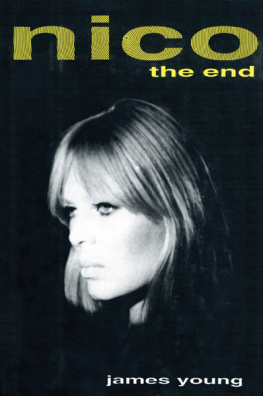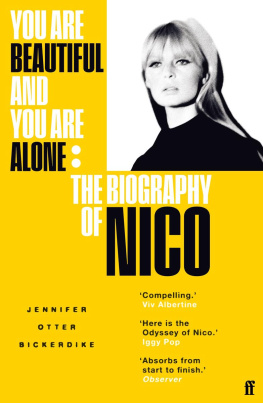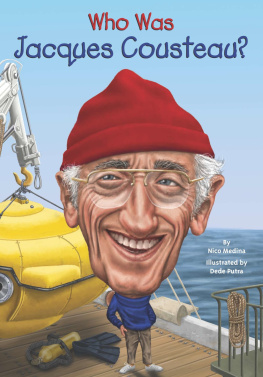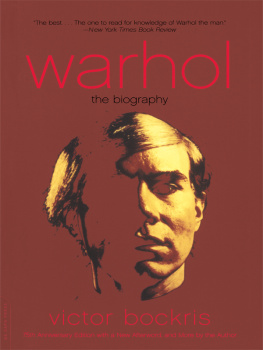Contents
About the Author
Richard Witts first met Nico when she appeared in a TV programme he co-presented for BBC2. She later visited his London apartment to watch a series of films starring her ex-lover Alain Delon, and just before her death she invited him to write her biography.
Formerly Director of Manchesters New Music Exchange, Londons Camden Festival, and South Hill Park in Berkshire, he now works on new opera projects in Paris. His background is music, and as a percussionist he played regularly with the Hall Orchestra, the contemporary music ensemble Dreamtiger, and the group The Passage.
Richard Witts has written many polemical articles on new music and modern dance, and he can be heard on arts programmes such as BBC Radio 4s Kaleidoscope. Of Witts, Nico said: I like to go over to his place because his TV has a good colour, and he has records Ive never heard of. He lives in Brighton.
This ebook is copyright material and must not be copied, reproduced, transferred, distributed, leased, licensed or publicly performed or used in any way except as specifically permitted in writing by the publishers, as allowed under the terms and conditions under which it was purchased or as strictly permitted by applicable copyright law. Any unauthorized distribution or use of this text may be a direct infringement of the authors and publishers rights and those responsible may be liable in law accordingly.
Epub ISBN: 9780753548486
Version 1.0
3 5 7 9 10 8 6 4 2
Virgin Books, an imprint of Ebury Publishing,
20 Vauxhall Bridge Road,
London SW1V 2SA
Virgin Books is part of the Penguin Random House group of companies whose addresses can be found at global.penguinrandomhouse.com
Copyright Richard Witts 1993
Richard Witts has asserted his right to be identified as the author of this work in accordance with the Copyright, Designs and Patents Act 1988
First published in 1993 by Virgin Books
www.penguin.co.uk
A CIP catalogue record for this book is available from the British Library
ISBN: 9780863696558
In memory of Linda Dorrell (19611992) who was killed in the Katmandu aircrash. She read the manuscript and kindly made things clearer for the writer.
Oh, come on, Linda, are you saying a man cant write about a woman like Nico? Dick Call yourself a man?
Nico ne semblait si belle que parce que dune fminit absolument joue. Quelque chose de plus que la beaut, de plus sublime, en manait, une sduction diffrente. Et il y avait une dception apprendre quelle tait un faux travelo, une vrai femme jouant au travelo.
La sduction est toujours plus singulire et plus sublime que le sexe, et cest quelle que nous attachons le plus de prix.
(Lternelle ironie de la communaut: De la sduction
Jean Baudrillard, 1979)
Nico seemed so beautiful only because her femininity appeared so completely put on. She emanated something more than beauty, something more sublime, a different seduction. And there was deception: she was a false drag queen, a real woman, in fact, playing the queen.
Seduction is always more singular and sublime than sex, and it commands the higher price.
(The Ecliptic of Sex, from Seduction
Jean Baudrillard, 1979, translated by Brian Singer)
Illustrations
Ulrich Wolff and Christa Pffgen, aged four, 1942
Christa and her mother Grete in September 1944, on Christas first day at school in Lbbenau
Ulrich, Helma, Christa and Bertha in Lbbenau, 1943
Grete in 1941
Helma, Christas aunt and other mother, 1941
Berlin, the south end of Christas street, 1948 (Landesbildstelle, Berlin)
Christa displays rings at an exhibition at the KaDeWe, Berlin, 1954 (Herbert Tobias)
Christa models for Bunte magazine (Herbert Tobias)
Nico and Prince Zadim Wolkonsky in a scene from La Dolce Vita (Kobal Collection)
Nico advertises the latest dishwasher in Elle magazine, 1961
Nico in the film Strip-Tease, directed by Jacques Poitrenaud and filmed in December 1962, five months after the birth of Ari
Nico with Andy Warhol in a publicity shot for The Chelsea Girls (BFI)
Nico and Andy Warhol as Batman and Robin for Esquire magazine, 1967 (Globe Photos, USA)
Nico and Philippe Garrel in La Cicatrice intrieure (BFI)
Nico in La Cicatrice intrieure (BFI)
Nico and her son Ari, 1981 (Antoine Giacomoni)
Nico on stage, 1985 (Paula Cox)
Nico in a London cemetery, for use on the cover of the Drama of Exile LP, 1979 (Antoine Giacomoni)
Introduction
History is a truth that in the long run becomes a lie, whereas myth is a lie that in the long run becomes a truth.
JEAN COCTEAU
WHY IS THAT miserable old junkie on the show? The comedian Ben Elton was pointing at Nico. I had to tell him that it was my doing, and that at least she was cheap. She lodged just three miles away from our TV studio in Manchester; she needed only her little Indian organ no backing band. Ben had not heard of her reborn cult status, of the Nico-teens who formed her new young following, nor that her fifth solo LP, Drama of Exile, was now out after two years of infamous litigation. He knew her as the Chelsea Girl, the High Priestess of Weird, the Sixties Warhol Superstar who turned fat and became a junkie, as Warhol bitchily noted in his diary.
In November 1983 Ben Elton and I were presenting a creaky youth TV series for the BBC (though it was less creaky than many). The Oxford Road Show was relayed live to the nation every Friday night, produced by 40-year-olds, researched by 30-year-olds, aimed at 20-year-olds and watched by 10-year-olds. Rock groups performed live, sometimes really live but mostly to a tape. Nico sang really live and I noticed a remarkable thing. She sang her rhapsodic Janitor of Lunacy without drums or guiding pulse of any kind. Yet the accuracy and discipline she displayed was that of a classical musician.
Nicos voice had been described in Andy Warhols Popism as an IBM computer with a Garbo accent and more romantically as a fragile lifeline through an inexpressible plague ridden past. Yet here was a deep, clear contralto tone, free of vibrato and exact in pitch. She was a professional. Nico had by then been singing for twenty years, succeeding her career as a fashion model. Her self-penned songs may have been the work of a nihilist, as she often claimed; she was certainly a heroin addict. However, her precision and dignity belied Bens image of her as that miserable old junkie.
In 1985 I met Nico more often. She stayed in a shared London flat near Brixton Library. I was living farther up Brixton Hill, and she would occasionally walk or cycle over to watch my TV because it has a good colour. One night she wanted to watch a dubbed French crimi film, because it stars my husband. Until I sat with her and watched the film, I did not know she meant Alain Delon. Hes dubbing his own voice, I recognise his tone he always must be in charge. He looks good for his age, doesnt he? Im glad we both have kept our image. Hes fifty and Im three years younger. Im glad you cant tell that. I had said no such thing, but I had noticed how much this film was stepping into real life. Delon was playing a police chief whose son was accused of murder. In actuality Delon had a son called Anthony who was, at that very time, arraigned for attempted murder. I asked Nico if she knew this. Oh, yes; he has destroyed my son. I was too shy to ask further. Isnt it funny to see this film, no? Its like a blueprint. Of course, Alain must always have some scandal to keep his picture in the papers. You remember his wife was caught up in a murder and then it was all hushed up? You mean you, Nico? No, his other wife, Nathalie. That was a bad year, when Brian Jones died in a swimming pool. In this way she would drift through her history and tell me stories, many of which contradicted others.













